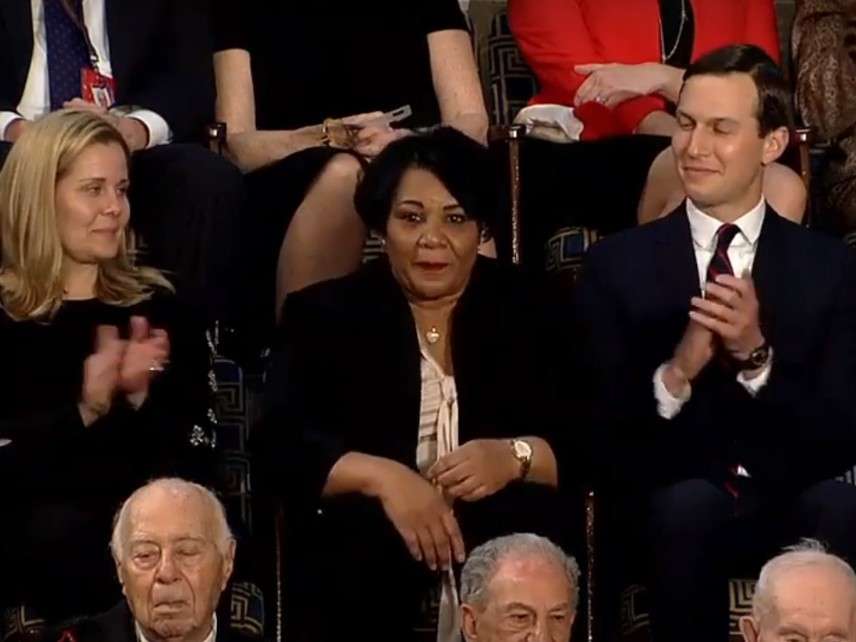Trump Decries Unjust Crack Sentences but Wants to Repeat the Mistake With Fentanyl
Reducing the thresholds for mandatory minimums in fentanyl cases will produce more injustices like the ones the president highlighted last night.

Donald Trump's remarks about criminal justice reform during last night's State of the Union address were striking and seemingly heartfelt. He introduced two former federal prisoners, both African American, who had received draconian sentences for nonviolent drug crimes: Alice Johnson, whom he freed last year by commuting her life sentence for participating in a cocaine conspiracy, and Matthew Charles, whose 35-year sentence for selling crack was shortened by the FIRST STEP Act, which Trump championed. "Alice's story underscores the disparities and unfairness that can exist in criminal sentencing, and the need to remedy this total injustice," he said. The president added that the FIRST STEP Act, which passed with overwhelming support in the House and Senate after he endorsed it, "reformed sentencing laws that have wrongly and disproportionately harmed the African American community."
Charles benefited from a provision of the FIRST STEP Act that retroactively applied penalty reductions approved by Congress in 2010. The 2010 law, the Fair Sentencing Act, was a belated acknowledgment that the crack sentencing scheme created by Congress in the 1980s was a panicky response to the drug menace du jour that proved to be irrational, unjust, and harmful to the very communities it was supposed to protect. Despite agreeing with that critique, Trump seems inclined to repeat the same pattern in response to the "opioid crisis."
Trump's references to that subject last night focused on the wall that he mistakenly thinks will stop the "lethal drugs that cross our border and flood into our cities." But according to the "Opioid Initiative" he unveiled last year, he also wants to "strengthen criminal penalties for dealing and trafficking in fentanyl and other opioids." Specifically, Trump urged Congress to "pass legislation that reduces the threshold amount of drugs needed to invoke mandatory minimum sentences for drug traffickers who knowingly distribute certain illicit opioids that are lethal in trace amounts."
Sen. Tom Cotton (R-Ark.)—who, not coincidentally, was a leading opponent of the FIRST STEP Act—introduced such a bill three days later. It would reduce the threshold for a five-year mandatory minimum from 40 grams to two grams of fentanyl and from 10 grams to half a gram of a fentany analog. The threshold for a 10-year mandatory minimum would drop from 400 to 20 grams of fentanyl and from 100 to five grams of an analog. Those weights apply to mixtures containing fentanyl or its analogs, so any detectable amount of either would effectively boost the penalties for selling heroin or other drugs.
The weight thresholds favored by Cotton could easily ensnare low-level dealers or minor participants in small drug trafficking operations, resulting in the same sort of injustices that the president decries in the context of crack sentences. Like the legislators who voted for the crack penalties that nearly everyone now agrees were excessive, Cotton thinks the special hazards posed by these particular drugs justify an especially harsh response.
"Fentanyl is one of the most dangerous drugs there is," the senator said when he announced the bill. "It killed more than 20,000 Americans last year and has been a driving force behind the opioid crisis in the United States. But while the epidemic has spiraled, our drug laws have been stuck in the past. This bill will make sure, when it comes to opioid distribution and trafficking, the punishment fits the crime."
Cotton is right that fentanyl and its analogs are involved in a large and rising share of opioid-related deaths—60 percent in 2017, according to the CDC. But the problem is not simply fentanyl's strength relative to heroin; it's the variability and unpredictability of black-market drugs. People could consume any of these substances without dying if they knew what they were getting, but prohibition makes that impossible, even as it drives traffickers toward more potent and compact drugs. Cotton's solution is to double down on an approach that is already making drug use much more dangerous than it would otherwise be.
While the difference between heroin and fentanyl is more significant than the difference between the smoked and snorted forms of cocaine, Cotton's notion that the government needs to hike fentanyl penalties so that "the punishment fits the crime" is highly dubious, even if you agree that voluntary transactions between adults should be treated as crimes. Not only are drug warriors like Cotton complicit in creating the deadly hazards they claim to be combating, but the street dealers they want to wallop with mandatory minimums may be just as much in the dark about the contents of what they're selling as their customers are. How is the average dealer supposed to know whether the "heroin" he is selling has been mixed with (or entirely replaced by) fentanyl? And if he doesn't know, subjecting him to extra-severe penalties makes no sense even as a deterrent, let alone as a proportionate punishment.
Trump seems genuinely torn between a "tough-on-crime" instinct that pushes him toward mindlessly punitive conservatives like Cotton and compassion for people like Alice Johnson and Matthew Charles, which ultimately led him to oppose Cotton and side with reformers such as Jared Kushner, Rand Paul, and (yes) Kim and Kanye in the debate over the FIRST STEP Act. The latter impulse may prevail in any given situation, depending on who talked to Trump last or made more of an impression. What's missing is an understanding that the policies Cotton favors will inevitably lead to more injustices like the ones the president highlighted last night.


Show Comments (2)